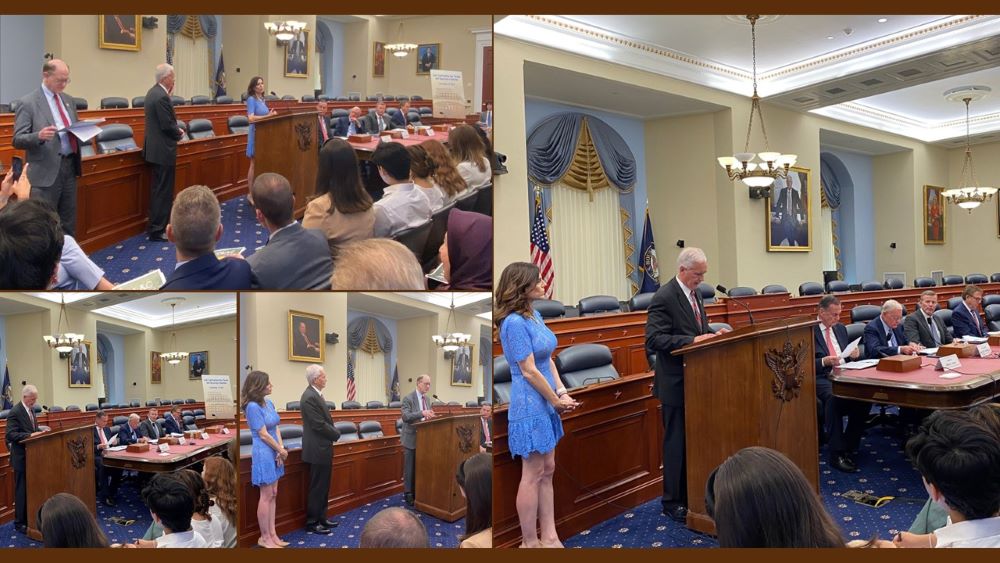
On September 10, 2024, the U.S. Congress held a bipartisan conference titled “Iran: Confronting the Threat and Securing a Solution,” featuring key figures from both political parties and prominent former military commanders. Attendees included Congressman Tom McClintock, Congresswoman Nancy Mace, and Congressman Brad Sherman, alongside former National Security Advisor General James Jones, former NATO Commander General Tod Wolters, Ambassador Lincoln Bloomfield Jr., and General Keith Kellogg.
The focus of the conference was on the increasing threats from Iran’s regime, the role of the organized Iranian resistance, and the necessity of a bipartisan U.S. policy. General James Jones stressed the importance of a strategic shift in dealing with Iran, particularly with the National Council of Resistance of Iran (NCRI) and the People’s Mojahedin Organization of Iran (PMOI/MEK). He emphasized the “eventual democratization of Iran” as part of a global battle between autocracies and democracies, and praised the NCRI’s leadership, stating, “Jeffersonian democracy for the future of Iran.”
Jones criticized the U.S. government’s past policy of labeling the MEK as a terrorist group, arguing, “Appeasement is not a strategy,” and urged the next administration to base its policies on “truth and facts,” as demonstrated by Ambassador Lincoln Bloomfield’s research on the NCRI and MEK. He also warned of the global implications of failing to counter Iran’s influence, including the emergence of alliances between autocratic powers that threaten international stability.
General James L. Jones, former President Barack Obama’s national security adviser from 2009-2010, who told The Independent in a statement that sanctions were “part of a kit” that the US can use to curb Tehran’s ambitions, but added:
“They have to be enforced.”“They have to have… https://t.co/7FQd2NcMrW
— OIAC: Organization of Iranian American Communities (@OrgIAC) September 13, 2024
In his remarks, Ambassador Bloomfield urged U.S. policymakers to reassess outdated views on Iran and its opposition. He expressed concern over how misinformation has shaped U.S. policy for decades, stating, “I want to make sure that we know the right facts about Iran.” He pointed to legal victories that removed the NCRI and MEK from terrorism lists, noting that appeasement efforts aimed at Tehran were misguided and ultimately failed.
Bloomfield also highlighted the NCRI’s increasing international legitimacy, with endorsements from numerous world leaders, parliamentarians, and Nobel laureates. He urged Congress to hold bipartisan hearings to reexamine U.S. strategy toward Iran and to recognize the NCRI’s potential to lead a peaceful transition in the country.
General Keith Kellogg warned of the ongoing threat posed by Iran, criticizing past U.S. administrations for misjudging the regime’s intentions. He stressed the need for a firm stance, warning that if Iran becomes a nuclear power, it would destabilize the entire Middle East. Kellogg called for renewed sanctions and, if necessary, military action to prevent Tehran from achieving nuclear capability.
General Tod Wolters echoed these concerns, emphasizing Iran’s role in destabilizing global security through its alliances and disinformation campaigns. He referred to the regime as an “illegitimate government” that uses strategic deception to mislead the international community and urged efforts to counter Iran’s influence through public education and awareness.
Congressman Brad Sherman highlighted the global consequences of Iran’s actions, including its support for terrorist groups and its nuclear ambitions. He praised the NCRI and MEK for their role in exposing Iran’s nuclear program and warned that only a democratic Iran could ensure a nuclear-free and terrorism-free future.
The Hon. @BradSherman, a senior member of the House Foreign Affairs Committee addresses briefing on US Iran policy today. He called for a US policy that engages the Iranian resistance & and especially highlighted clerical regime's fear of the @Mojahedineng & the @iran_policy pic.twitter.com/M2MYLoZwc9
— OIAC: Organization of Iranian American Communities (@OrgIAC) September 10, 2024
Congressman Tom McClintock emphasized the broad bipartisan support for the NCRI and its Ten-Point Plan for Iran’s future, urging the global community to back the Iranian opposition to bring about meaningful change.
H. Res. 100 has 243 bipartisan co-sponsors – a clear majority of the House of Representatives. It expresses our united support for the Iranian people in their struggle for a democratic, secular, and non-nuclear Republic of Iran. pic.twitter.com/1IT9Xy0TdP
— Tom McClintock (@RepMcClintock) September 10, 2024
Congresswoman Nancy Mace expressed her strong support for the Iranian people’s fight for democracy, reflecting on her experience at the Free Iran 2024 World Summit in Paris. She underscored the need for international solidarity, particularly in supporting Iranian women whose protests have “inspired global solidarity and revealed the regime’s oppression.”
Together, the speakers called for a reassessment of U.S. policy on Iran, with a focus on supporting the Iranian opposition and preparing for a democratic transition in the country.
Today in the US Congress:
Hon. @RepNancyMace addresses briefing & panel discussion on Iran, recalling her meetings with former Iran political prisoners and calling on the US to provide political support to the Iranain people & their organized resistance. @Maryam_Rajavi pic.twitter.com/xdvUFf2iKQ— OIAC: Organization of Iranian American Communities (@OrgIAC) September 10, 2024